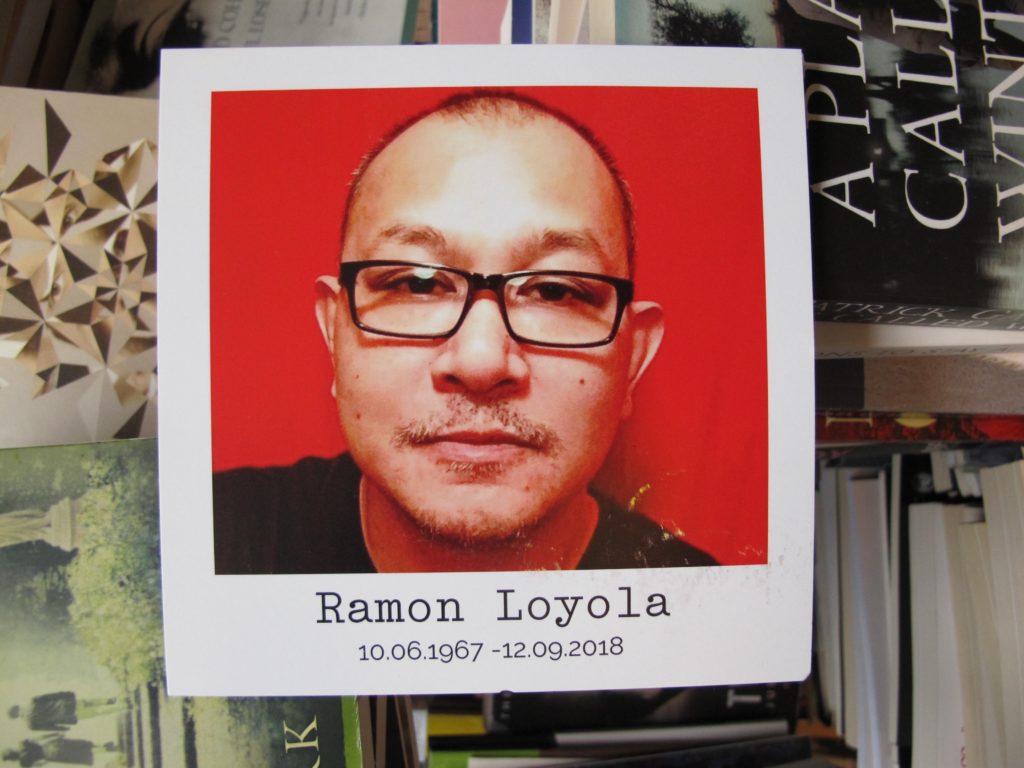 After the memorial for Ramon, I was about to leave when I heard his sister asking a small group of people, ‘What shall we do with his books? They were his most prized possessions. We don’t know what to do with them.’
After the memorial for Ramon, I was about to leave when I heard his sister asking a small group of people, ‘What shall we do with his books? They were his most prized possessions. We don’t know what to do with them.’
No one volunteered and I thought: I can help out. I couldn’t imagine trying to sort out a loved one’s possessions in a city that wasn’t mine. And it’s one of my traits, to try to put everything in its right place.
 I didn’t know Ramon Loyola well, a Filipino poet, who had lived in Sydney for decades, and died suddenly from a brain aneurysm in September at the age of 51. He had introduced himself to me at The Bookshop Darlinghurst once, and pointed out his books, self-produced poetry books that he was leaving for sale there. I looked him up online afterwards and then ran into him once or twice at literary events. I remember him reading the work of a Filipino writer at the launch of Julie Koh’s Books Actually’s Gold Standard at Better Read than Dead. From the event, he posted a photo of me and Tom Cho talking, calling us ‘brilliant writers’ and himself a ‘fan boy’. I found that flattering. He also wished me happy birthday on Facebook every year.
I didn’t know Ramon Loyola well, a Filipino poet, who had lived in Sydney for decades, and died suddenly from a brain aneurysm in September at the age of 51. He had introduced himself to me at The Bookshop Darlinghurst once, and pointed out his books, self-produced poetry books that he was leaving for sale there. I looked him up online afterwards and then ran into him once or twice at literary events. I remember him reading the work of a Filipino writer at the launch of Julie Koh’s Books Actually’s Gold Standard at Better Read than Dead. From the event, he posted a photo of me and Tom Cho talking, calling us ‘brilliant writers’ and himself a ‘fan boy’. I found that flattering. He also wished me happy birthday on Facebook every year.
 When I heard he’d died, I wanted to go to his memorial, organised by Michele Seminara, who worked with him on the literary magazine Verity La. She asked for readers for his poems, and I wanted to read one of his poems to honour him. I never had the chance to tell Ramon how much I admired his quiet determination to write, constantly, and to get
When I heard he’d died, I wanted to go to his memorial, organised by Michele Seminara, who worked with him on the literary magazine Verity La. She asked for readers for his poems, and I wanted to read one of his poems to honour him. I never had the chance to tell Ramon how much I admired his quiet determination to write, constantly, and to get his writing out to the world, through his books (one of the latest of which was published by Vagabond Press, who I also admire) and his websites. I knew he had a true passion for words, and for sharing them with others.
his writing out to the world, through his books (one of the latest of which was published by Vagabond Press, who I also admire) and his websites. I knew he had a true passion for words, and for sharing them with others.
The memorial was on Labour Day weekend, so a number of his friends couldn’t make it and were away. It was an intimate, beautiful gathering at a Turkish restaurant in Glebe. His sisters, one who had flown in from the Philippines and the other from California, his brother who lives in Sydney, and his favourite niece from the Philippines were all there. There were beautiful cards printed with one of his favourite photos of himself on the front, and a poem on the back, appropriately, a farewell.
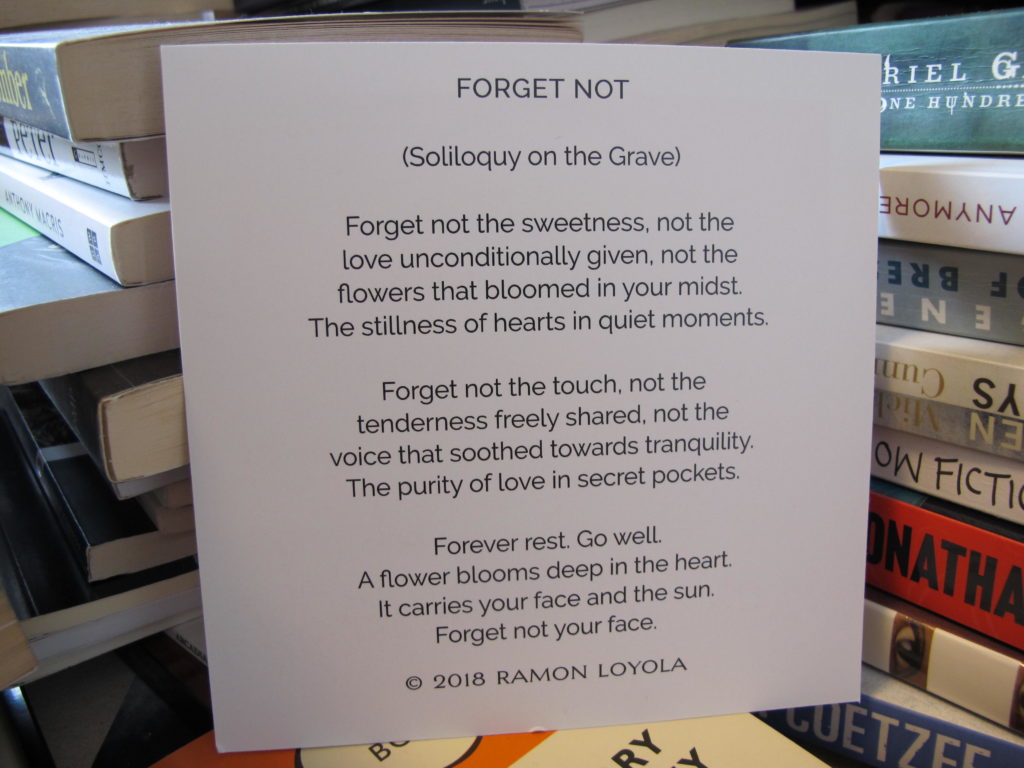 It was wonderful to learn more about him: that he was from a family of eight children, how shy he was, how he didn’t like photos of him smiling as he believed it made his face look too wide, how he was respected as a lawyer at his workplaces, and how he was very positive and supportive of other writers. He was always working on his writing, never feeling it was good enough, and likely had no idea how much he was loved and respected. His niece explained that when they were together, they would sing, always, and one of his favourites was the Carpenters. She sang, a capella, in a beautiful voice, shaking with emotion ‘I won’t last a day without you’. It broke my heart.
It was wonderful to learn more about him: that he was from a family of eight children, how shy he was, how he didn’t like photos of him smiling as he believed it made his face look too wide, how he was respected as a lawyer at his workplaces, and how he was very positive and supportive of other writers. He was always working on his writing, never feeling it was good enough, and likely had no idea how much he was loved and respected. His niece explained that when they were together, they would sing, always, and one of his favourites was the Carpenters. She sang, a capella, in a beautiful voice, shaking with emotion ‘I won’t last a day without you’. It broke my heart.
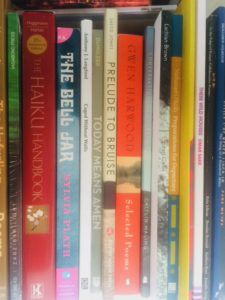 His sister told us that he loved his mother so much that he sent her money regularly to take of her. But she in turn loved Ramon so much, and hoped that he would come back to the Philippines to retire and would need money, so she saved all the money that he sent her – for him. His sister also told us that his apartment was a mess! He spent all his time on the more important tasks of writing (or reading or watching DVDs and listening to CDs) rather than taking care of the place.
His sister told us that he loved his mother so much that he sent her money regularly to take of her. But she in turn loved Ramon so much, and hoped that he would come back to the Philippines to retire and would need money, so she saved all the money that he sent her – for him. His sister also told us that his apartment was a mess! He spent all his time on the more important tasks of writing (or reading or watching DVDs and listening to CDs) rather than taking care of the place.
A few days after the memorial, I realised that Ramon’s family needed to get his books out from his apartment. They had important things to do, finishing cleaning up and cleaning out the apartment, getting permission to get him back to the Philipines for his funeral, and then fly home. The organisations I had thought of to take books would take a few, but not all: it would be easiest for me to just to take the whole lot of books and figure it out. So, late at night, when Ramon’s brother Rey could park his car outside of Ramon’s Newtown apartment and load up eight large packing boxes of books, he and his beautiful niece Chrissy dropped them all off at my apartment building in Surry Hills.
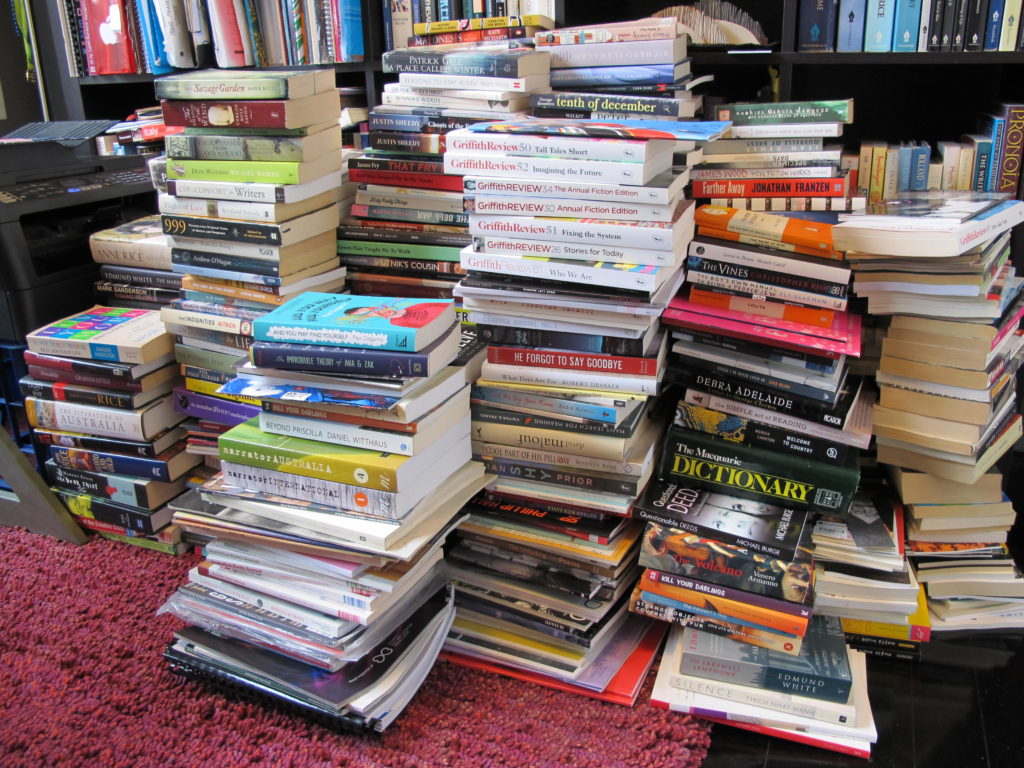 So, there I was, surrounded by Ramon’s books, and getting to know him through them. It was a huge collection of mostly contemporary international and Australian literature with bookmarks and receipts from Better Read than Dead in Newtown, the Bookshop Darlinghurst, Oscar & Friends, Elizabeth’s, the Book Depository and Booktopia. He had a healthy collection of gay fiction. We had many favourite authors in common such as Michael Cunningham, Jonathan Franzen and Edmund White. The great writers are all here like Alice Munro, Salman Rushdie and Gabriel Garcia Marquez. He had a good amount of Australian writers: Helen Garner, David Malouf, Patrick White.
So, there I was, surrounded by Ramon’s books, and getting to know him through them. It was a huge collection of mostly contemporary international and Australian literature with bookmarks and receipts from Better Read than Dead in Newtown, the Bookshop Darlinghurst, Oscar & Friends, Elizabeth’s, the Book Depository and Booktopia. He had a healthy collection of gay fiction. We had many favourite authors in common such as Michael Cunningham, Jonathan Franzen and Edmund White. The great writers are all here like Alice Munro, Salman Rushdie and Gabriel Garcia Marquez. He had a good amount of Australian writers: Helen Garner, David Malouf, Patrick White.
There was also a collection of Anne Rice in hardcover, as well as the books of her son Christopher Rice, and a handful of other fantasy and horror books, as well as books about Australian soldiers, and the war. He was an eclectic reader.
 The other largest selection of books was poetry, and many of them anthologies of new and younger writers, put out by various Australian writing collectives and universities. I would guess that there were poetry books from nearly every Australian poet that I knew. You could feel that he was both interested in other people’s writing, but also supportive. I found copies of all four of my books; most of my friends don’t even have all of my books.
The other largest selection of books was poetry, and many of them anthologies of new and younger writers, put out by various Australian writing collectives and universities. I would guess that there were poetry books from nearly every Australian poet that I knew. You could feel that he was both interested in other people’s writing, but also supportive. I found copies of all four of my books; most of my friends don’t even have all of my books.
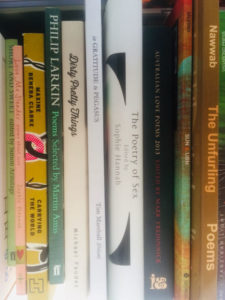 There were many Australian literary magazines, and some international ones. A stack of reference books, dictionaries and phrase books, and many books about writing and how to be a writer and how to read fiction. There are books that hint at other passions – on photography and drawing – and preoccupations – anxiety, being an introvert, how to combine work with passion.
There were many Australian literary magazines, and some international ones. A stack of reference books, dictionaries and phrase books, and many books about writing and how to be a writer and how to read fiction. There are books that hint at other passions – on photography and drawing – and preoccupations – anxiety, being an introvert, how to combine work with passion.
Those same days, surrounded by Ramon’s books, there was an article on the New York Times website about tsundoku, a Japanese word referring to the books you’ve bought but not yet read. Kevin Mims wrote that the ‘sight of a book you haven’t read can remind you that there are many things you’ve yet to learn. And the sight of a partially read book can remind you that reading is an activity that you hope never to come to the end of.’
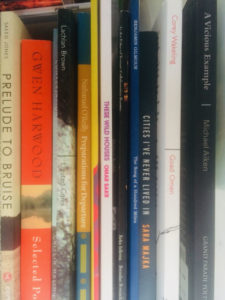 I like those sentiments. I wonder which of the books Ramon read, and which he didn’t get around to reading, and which of his books that I find new homes for will be read or unread.
I like those sentiments. I wonder which of the books Ramon read, and which he didn’t get around to reading, and which of his books that I find new homes for will be read or unread.
The process of divesting of the books took effort but was a fun puzzle. And I’m good at this giving away business. I’ve been through it, helping my Mom clear out the family home after Dad died, so she could move into a much smaller apartment.
I printed labels to put near the front of the books. I didn’t have enough for all of them so it was a random exercise. I picture, for decades, people picking up books and finding the inscription and either remembering Ramon or googling to find out who he was.
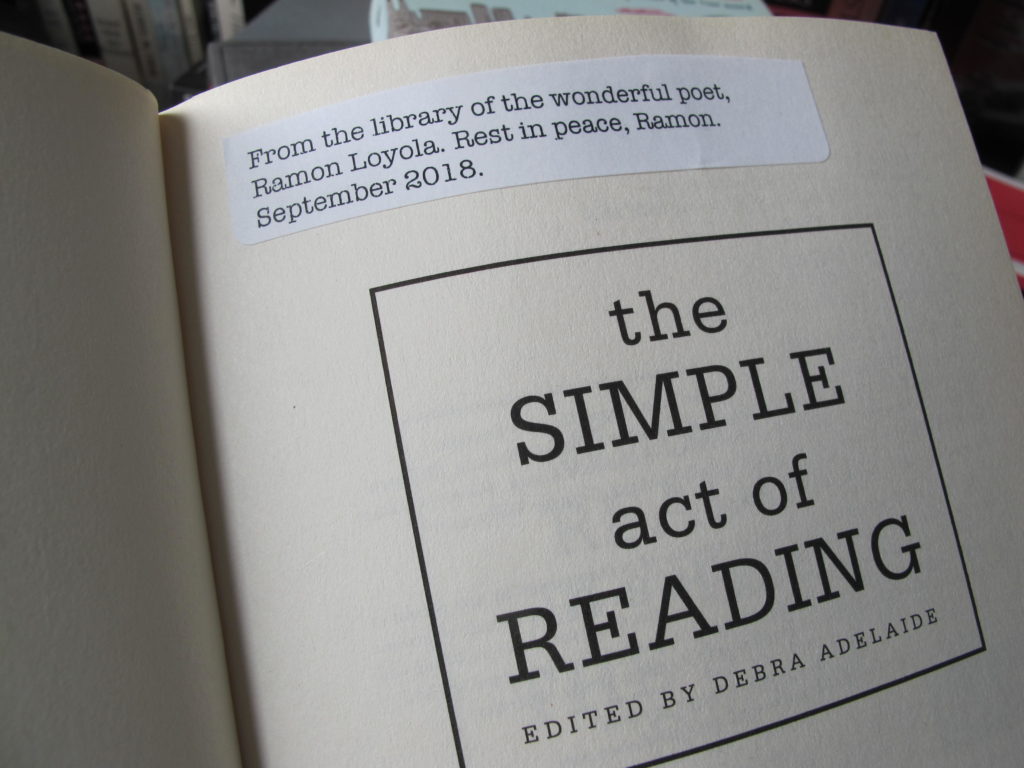 I made a post on Facebook including photos of some of the books and invited various of Ramon’s friends to come over to look at his books, though most didn’t want to take too many. I gave much of books about writing and literary magazines to Writing NSW, knowing they have a library at their big headquarters in Rozelle. A small stack of legal
I made a post on Facebook including photos of some of the books and invited various of Ramon’s friends to come over to look at his books, though most didn’t want to take too many. I gave much of books about writing and literary magazines to Writing NSW, knowing they have a library at their big headquarters in Rozelle. A small stack of legal 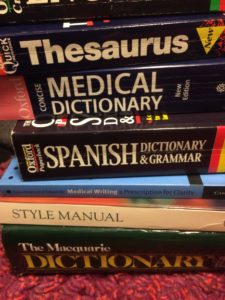 reference books was divided between his old workplace (his colleague seemed sad upon receiving them) and the shelves of my own lawyer. The gay books went to Twenty Ten, the LGBT youth counselling service, and I hope they reach some young literary gays and lesbians. A stack of books from Filipino writers and on Filipino history, I arranged to get to his friend Eunice, a young Filipina writer, who spoke at the memorial service. She was overseas by the time I had sorted through the books but my husband kindly drove me to her parents place to drop them off.
reference books was divided between his old workplace (his colleague seemed sad upon receiving them) and the shelves of my own lawyer. The gay books went to Twenty Ten, the LGBT youth counselling service, and I hope they reach some young literary gays and lesbians. A stack of books from Filipino writers and on Filipino history, I arranged to get to his friend Eunice, a young Filipina writer, who spoke at the memorial service. She was overseas by the time I had sorted through the books but my husband kindly drove me to her parents place to drop them off.
His friends who are poets took many of his books of poetry. I took a small selection of books for myself and then convinced a few friends who are readers to come take more. The writer Tom Cho saw a favourite book in the photo on the Facebook post and asked me to send it to him in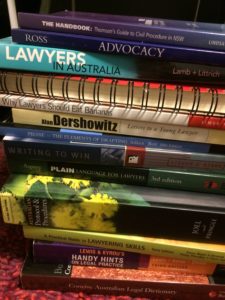 Toronto, his new home, as a memory of Ramon.
Toronto, his new home, as a memory of Ramon.
I was particularly happy with the new home for Ramon’s copy of my short stories, Calendar Boy. His copy had been inscribed to a friend of mine, Tim, a transplant from Brisbane to Sydney, with the date February 08. But when I asked Tim whether it was his copy, he had said while he and Ramon had dated, many years ago (which I didn’t know) that Ramon must have bought it from Elizabeth’s, the used bookstore Tim had sold it to. Around that time, Stuart Barnes, the poet, had invited me to write a poem for the TRANSQUEER edition of the Cordite Poetry Review. I’d wanted to thank him afterwards, so it seemed appropriate to send my book to him in Queensland, that had been owned by a friend of mine from Queensland, and then by Ramon, who Stuart was friends with.
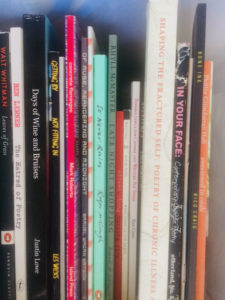 The very last books were a harder task to figure out. I thought of donating them to the Australian Red Cross or the Wayside Chapel but I preferred them to go somewhere where the books would have a better chance of reaching those who would appreciate them. One of Ramon’s friends contacted me to say that she held literary events from time to time, at which she always gave away stacks of books as door prizes or for raffles. That sounded perfect to me. She seemed to be in-between homes at the time so I dropped off the final boxes of books to her at an inner city self-storage unit, one of those big echoey buildings with hundreds of small rooms with metal roller doors, where she was storing her other possessions.
The very last books were a harder task to figure out. I thought of donating them to the Australian Red Cross or the Wayside Chapel but I preferred them to go somewhere where the books would have a better chance of reaching those who would appreciate them. One of Ramon’s friends contacted me to say that she held literary events from time to time, at which she always gave away stacks of books as door prizes or for raffles. That sounded perfect to me. She seemed to be in-between homes at the time so I dropped off the final boxes of books to her at an inner city self-storage unit, one of those big echoey buildings with hundreds of small rooms with metal roller doors, where she was storing her other possessions.
And that was that. Ramon’s books out to the world, to strangers and friends, reminders of his passions and personality, his vocations and inclinations.
It makes me wonder  where my books will go when I die.
where my books will go when I die.

Pingback: IN MEMORIAM RAMON LOYOLA 10.06.1967-12.09.2018 - Verity La